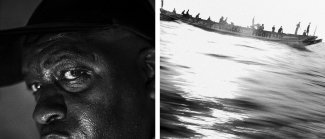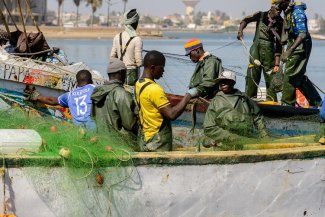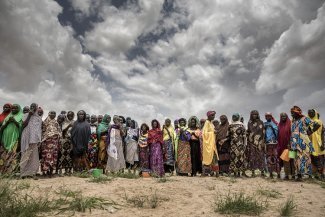Every year, tens of thousands of people risk their lives leaving Senegal. A certain number of them return to their home country after spending just a few months or years abroad.
The reality that migrants encounter on their road to exile doesn’t always live up to their expectations. Returning home, however, whether by choice or due to forced repatriation, is often complicated. With unemployment high in Senegal, many families see migration to Europe as a prospect of a better future. The men and women who return home are often confronted with a complex mixture of emotions, particularly shame and regret. They carry with them the burden, sometimes years after returning home, of failing to live up to the hopes of their families and communities.
These people go from being a solution to feeding their loved ones, to becoming a financial burden. They feel torn between their hope of building a new life and their desire to reintegrate. They struggle with the ‘moral debt’ they owe to their families, who have often invested money in their outward journey.
In this photo series, photojournalist Jennifer Carlos tells the stories of returnees Macoumba, El-Hadj and Moustapha, aiming to show the challenges they face, the dreams that drive them and the inner strength they continue to exude.

Pirogues set sail under the cover of darkness, regularly transporting more than a hundred passengers from Senegal to the Canary Islands. Thiaroyes-sur-Mer, Dakar. October 2022.
In Thiaroyes-sur-Mer, a suburb of Dakar with a population of 80,000, the subject of undocumented immigration is omnipresent. This former fishing village is now better known for the number of lives lost at sea than for the quality of its fish.

“The journey was very hard but the worst part was returning home. My family had placed so much hope in me. Leaving and coming back is shameful,” says El-Hadj, 39. Thiaroyes-sur-Mer. October 2022.
With financial support from his mother, El-Hadj made the journey to the Canary Islands in 2006, but his dreams were shattered when he was repatriated 42 days later. Back in Senegal after this first attempt, El-Hadj found himself in debt. Thanks to the support of a fisher friend, he found a job and was able to get married and start a family with two children.
Unfortunately, his financial situation remained critical, forcing him to try his luck again. In 2009, El-Hadj attempted another crossing via Morocco. He was arrested by the Moroccan police and deported to the desert near the Algerian border. Back in Senegal once more, his sense of shame and guilt grew with this second failure and he sank into depression.

“When I returned to Senegal after my second attempt, I was so overwhelmed with shame that for two months, I would only return to the village at night to sleep so I wouldn’t run into anyone. In the morning, I would leave the village to go hide,” says El Hadj. In this image, he waits, frustrated that he can’t take his boat out this morning because the sea is too rough. October 2022.
“The looks people give you are harsh and there are a lot of rumours. A lot of people say that I left to squander my mother’s money. I feel guilty because I caused my mother a lot of stress. She had a stroke and part of her body is paralysed”.
As the months went by, El-Hadj took up fishing again and was gradually able to regain the trust of those close to him.

As El-Hadj passes a Chinese trawler, he explains: “It’s the fishing agreements that are killing us. There used to be lots of fish. But now, the foreigner trawlers are snatching up everything with their huge boats. There’s nothing left for us and I’m barely able to scrape out a living.” Thiaroyes-sur-Mer. September 2022.
As a consequence of international fishing agreements that allow foreign trawlers to exploit Senegalese waters, many small-scale Senegalese fishers like El-Hadj are struggling to survive.
“I’m powerless because I don’t have enough money to live on, let alone to look after my sick mother. My son has a hernia, and it would cost 250,000 CFA francs to operate”. Despite everything that he’s been through and the debts he still has, his family is urging him to leave again. The financial situation is still too difficult.

When he returned to Senegal, Moustapha, 54, was not well received by those close to him, especially his wife: “My wife was disappointed to see me again and she left me. She hoped I would stay in Europe to send her money”. Thiaroyes sur Mer. July 2023.
Like El-Hadj, Moustapha was deported from the Canary Islands, in 2006 and 2019. Financial expectations can generate tensions within families, and Moustapha has had to juggle disappointment with the need to reintegrate into his community.

Moustapha (centre) spends much of his time with young people in his town raising awareness about the dangers of migrating by pirogue. Thiaroyes sur Mer. October 2022.
As president of the Association des Jeunes Rapatriés de Thiaroyes-sur-Mer (Association of Young Returnees of Thiaroyes-sur-Mer), Moustapha is committed to raising awareness among local young people. He informs them about the risks of migration and helps facilitate access to vocational training.
Moustapha is trying to forge partnerships to finance a variety of training courses, supported in particular by the GIZ and Caritas organisations, in professions including pastry-making, construction and electricity.

Moustapha, pictured with his son to the left, regularly meets his friend for tea. “I don’t have many friends in the village. People don’t respect me here.” Thiaroyes-sur-Mer. October 2022.
Despite his best efforts, Moustapha isn’t always able to convince young people looking for work to stay in the country. Nevertheless, he persists in his commitment and hopes to secure more funds to counter emigration from his village.

Macoumba, 40, trains for selection for the 2024 Paralympic Games in hand cycling. Dakar July 2023.
In 2002, at the age of 19, Macoumba was sent to France by his father to improve his family’s living conditions. Shortly after his arrival on a tourist visa, he travelled to Granada, Spain, to a migrant house, with the aim of selling wooden sculptures to tourists as a street vendor. He was unsuccessful.
With his visa about to expire, Macoumba decided to join the Foreign Legion of the French army as a last resort to stay in France. His exceptional physical condition quickly set him apart and he became one of the best marksmen in his class. For several years, he was part of military units deployed in various conflict zones, including Côte d’Ivoire, Djibouti and the Central African Republic.
During an operation in 2008, he injured his spine in an accident, which left him paralysed below the waist. Despite this setback, he remains resolutely optimistic: “I gave part of myself for France. When I woke up in hospital, I was laughing, I was so happy to be alive. I was so lucky.”

Macoumba lies on the ground after completing a ride of more than 60 kilometres on a handbike in his home village in the Kaolack region. “When I discovered cycling, it allowed me to forget all my worries. Nothing could get to me anymore.” Keur Alpha. July 2023.
In 2011, he made the courageous decision to return home to Senegal, despite the stigma attached to his disability. He ultimately went into the property business, got involved in humanitarian work and now competes professionally in hand cycling.
Currently ranked 8th in the world in para-cycling, his ultimate goal is to represent Senegal with dignity at the 2024 Paralympic Games. “I’ll know in May if I’ve been selected,” he says.

Macoumba and his wife Sophia sit together in their bedroom. Dakar. September 2023.
“During my rehabilitation,” Macoumba recalls, “I had to relearn the basics, and I often wondered how I would cope with the way people looked at me. I decided that I wanted to return to Senegal but I was worried about accessibility and the stigma attached to disabled people. Fortunately, my return went very well and I received invaluable support.”














